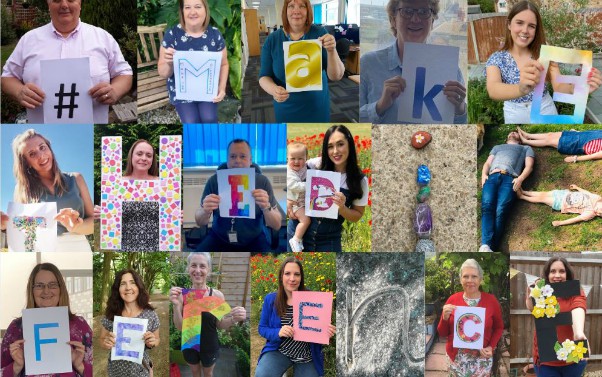Gloucestershire County Council’s #MaketheDifference project – based on a strengths based model of practice – is that rare development in social care that is a win-win-win for residents needing support, social care practitioners and the council as a whole.
The project was inspired by listening to social workers and other practitioners themselves.
“We do the social work health check every year and the results were telling us that the staff were fed up with the level of bureaucracy,” says Julia Walkley, project lead for #Makethedifference.
Through reviewing approaches to how work is received and responded to, people are now contacted or seen on the day they get in touch with the council or shortly after. More significantly, people are no longer fitted into services but listened too intently so that practitioners understand and can identify, with the person, what will make the difference to enable them to live the lives they wish resulting in greater independence and wellbeing.
Through new ‘hubs’, practitioners are working more collaboratively with each other and benefiting from greater peer support to achieve the best outcome that is right for that person. They have been liberated from much of the paperwork they previously had to fill out, meaning they have more time to get to know the people they work with and the communities they work in, using their social work skills to support and improve people’s lives.
‘Waiting lists all but eliminated’
The approach – in particular the drive to go and see people as soon as possible – has resulted in waiting lists being all but eliminated and a substantial reduction in the amount of time it takes to put support in place.
“It’s not rocket science but we worked out that the sooner we saw people the better,” says Julia. “The longer you wait for something, the worse things can become; if in doubt we’ll go out. We have a real opportunity to support a person to maximise their own level of independence, and ability to help themselves, within their own communities”, says Julia.
The main focus of #Makethedifference is that workers take more time to get to know a person before completing any paperwork or considering any support, formal or informal. This may require several visits or accompanying a person in an activity; this approach really helps workers to understand the person better, and identify more relevant solutions. Of course, practitioners respond to an emergency situation with short-term formal support if needed; and then have time to consider with the person what their long-term needs might be.
Under the old system it took about 60 to 70 days on average from meeting the person to support planning; now it’s around 15-16 days.
‘Peer support and shared decision-making’
One facet that emerged as crucial early on was forming practitioners into smaller groups of around five people within their teams known as ‘hubs’, each with a hub lead. Together they hold regular “huddles” to discuss the people they’ve met, share ideas and, in some cases, offer constructive challenge of one another’s thinking.
“We’re all used to doing that in a 1-2-1 setting” Julia says, “but as hubs people discuss alternatives, saying ‘have you tried? did you know?” in this way sharing knowledge and learning and making it a supportive decision-making process.”
It has not all been plain sailing as some practitioners have found #Makethedifference challenging.
“The questioning and the way of working is very different from managing a process,” says Kit Whitehead, integrated social care Manager for the Stroud team. “Some people have struggled in not being told what to do.”
However, as Julia says, “this is where the hub approach has come into its own as practitioners have learned from the success and knowledge of their colleagues. In hearing one another’s conversations, we’ve definitely had some “lightbulb” moments within the hubs.”
The adoption of the hub approach was “a massive turning point for me”, says Scott, an adult social care practitioner. “It enables us to speak more to colleagues and get their perspective; they might know about a service in the community that the person you are working with can then get access to.”
Scott adds: “I worked with an individual who had cancer and we were speaking about it in the hub and a colleague mentioned a local charity that could offer support and I was able to tap into that.”
‘Making connections’
This is another key element of the model – practitioners are able to get to know their communities to enable them to connect people with local sources of support.
Julia says: “Before we thought we knew our community quite well but we worked out that we knew what we knew. If you’re in a rush you will use a service you know. We really encouraged our staff to walk the streets and look at noticeboards and walk into village shops.”
Now, practitioners really grasp the opportunity to connect people to other forms of support available within their local communities and this may be instead of, or in addition to, more traditional forms of support. This in turn can mean people are able to remain living in their own homes for longer and this contributes to supporting the local authority to make best use of its resources.
From a management perspective, Keith Vardy, now the head of adult social care operations and until recently, the longstanding integrated social care manager of the learning disabilities team, says he has seen a tremendous difference made to people he has worked with in the past.
“I’ve worked with people with learning disabilities in Gloucestershire all my career,” he says. “I know quite a lot of the people we work with and the new things I’ve found out about some of those people that I never knew previously – things that people were capable of that we would never have thought of when we were filling out a lengthy assessment form – is remarkable.”
Changes included revising role titles and, for some leadership posts, increasing autonomy and responsibility – reflected in enhanced salaries. Lines of accountability are also clearer, which enables staff to work within a more clearly defined, supportive structure. The changes also provide a clearer career pathway to both registered and non-registered staff.
Working under Covid
Meanwhile, whilst being an approach that thrives on time and communication between practitioners and residents, and also between practitioners themselves, #Makethedifference has survived the transition to significant levels of remote working that are the result of Covid-19.
“The big change in working practices necessitated under Covid-19 posed challenges for the model but it has proved resilient to these changes”, says Moira Wood, Gloucestershire’s principal social worker for adults.
Like many authorities, the council switched to a seven-day-a-week, 12-hour-a-day service with practitioners who were able to staff this working in three hubs, and remaining staff working from home to their normal pattern.
“We’ve had to do things differently because people have not wanted us to go into their homes and we’ve not wanted to expose them or our staff to unnecessary risk,” says Moira. “We’ve had situations where we’ve had to make in-person visits and we’ve had risk assessments completed and access to appropriate PPE. It’s been remarkable and really impressive the way in which our staff and service has been responsive and flexible enabling us to continue to provide services in the way we have.”
“With staff largely working remotely from their homes, what became clear was staff were missing being physically present with their colleagues which was to be expected but they were equally missing the benefit of huddle discussions and shared decision making”, says Moira. “Whilst this wasn’t unexpected, it was pleasing to see that it was the staff themselves who quickly recognised the need for this to be re-established using “virtual” means; they recognised the value of their huddles. Huddles now happen virtually, and this supports our practice model, our staff, and in turn supports the residents in Gloucestershire who need our support.”
Since the outbreak of Covid 19, in continuing business as usual, Gloucestershire’s adult social care service has adapted its recruitment process in accordance with government guidance and is now able to offer interviews by virtual means. With streamlined processes in place, the process of recruitment has become more efficient and, in addition to offering a relocation package to social workers residing outside of Gloucestershire, new starters can be assured of immediate support through the delivery of online induction, training and e-learning provided by the dedicated practice development team. Continuous professional development opportunities are available to support staff in their career and with a clear career pathway in place and supportive leadership and management available too, Gloucestershire seeks to attract experienced social workers.
If you are interested in a career in adult social care at Gloucestershire County Council, take a look at its latest vacancies here.




 Facebook
Facebook X
X LinkedIn
LinkedIn Instagram
Instagram